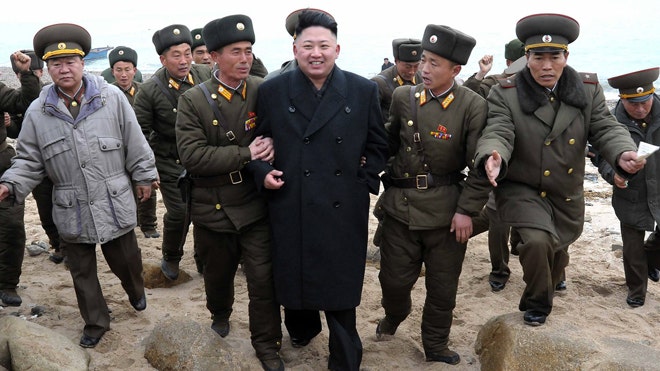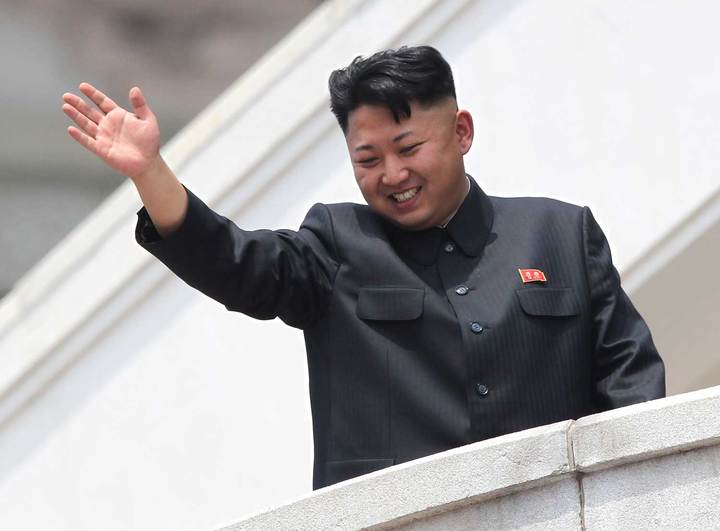In one of the previous articles we reviewed the reasons for which the heads of the Korean states were absent on May 9 in Moscow, but Kim Jong-un didn’t go to the Beijing celebrations either which were nominally much closer and more important.
Moreover, if North Korea was represented in Moscow by the official head of the state Kim Yong-nam, China was visited by the Secretary of the Central Committee of the Workers’ Party of Korea Choe Ryong-hae who is considered to be responsible for controlling the relations of the Democratic People’s Republic of Korea and China.
Choe Ryong-hae wasn’t among the guests of honor; he even arrived and departed on a regular flight and not on a governmental flight.
Of course, Choe Ryong-hae occupies a higher position in the informal hierarchy of the Democratic People’s Republic of Korea than Kim Yong-nam; and for some time he was even considered as the “Number 2″ in the country after the execution of Jang Song-thaek, from whom he inherited, inter alia, the position of “one, who is controlling relations with China”, but, apparently, currently he isn’t “Number two” or “Number three”.
That episode generated a number of rumors and “hopes”: anti-North Korean commentators started to draw conclusions that the relations between Pyongyang and Beijing at the moment are worse than ever, and that either Pyongyang was ostentatiously put into place, or Kim doesn’t want to make up with China, but regardless, China most likely is just about to refuse providing support to the Democratic People’s Republic of Korea.
Frankly speaking, talks that “Beijing is about to cut ties with Pyongyang and reunification is inevitable” are no less worn-out subjects, than that of the Korean peninsula is “again on the verge of war”; and therefore we should explain what Chinese-North Korean relations look like in general, and also why Kim Jong-un didn’t go to Beijing.
The first visit of the head of state always draws attention and quite often appears to be an obvious demonstration of where the country is oriented to during the period.
In the Far East, where ceremonies are valued more, it is especially important and it is enough just to look carefully at the schedule of visits of the most of leaders of South Korea to understand where the suzerain is.

In this context, the author even heard rumors that the unwillingness of Beijing was one of the reasons of absence of Kim Jong-un during the Moscow parade: it is said, with the present relations of China and the Democratic People’s Republic of Korea the first visit of the head of North Korea shall be made to China.
So, formally China is the leading trade partner of the Democratic People’s Republic of Korea; it is the host of the six-party negotiations and it is the country’s position which partly determines the Korean question to the UN.
Therefore, it cannot be excluded that the North Korean leader, showing an acute reaction to any attempts to teach him how to live, ignored the September event out of principle.
The matter is that there were two types of foreign guests present at Beijing: guests of honor, like the leaders of the Russian Federation or the Republic of Kazakhstan, or assumed tributaries.
It is not a secret that the fact that Chinese foreign policy became more active it is often perceived as a change of attitude of China to the border countries and territories.
If earlier, about fifteen years ago, documents of Chinese analysts defined the border countries as the “favorable environment”, nowadays the attitude towards them has become more consumer-type or more hegemonic.
China builds a model within which “the small countries” shouldn’t openly oppose their role to the role of the Median State.
Korea in this situation occupies quite an important place. First, from a geopolitical point of view, North Korea covers the Northeast region, which is important for China, and serves as a kind of “buffer”.
Secondly, in history, Korea was always perceived as the closest and theoretically an exemplary vassal of China. It was to such a degree, that in the 17th -18thcenturies Korean Confucians perceived the country as “small China” in which traditions and spirituality were even more authentic, than in “big China” where Manchurians came to power.
Economic penetration of the People’s Republic of China to the Korean peninsula is really significant and it is possible to say that China tries to tie the Democratic People’s Republic of Korea to itself, especially taking into account that thanks to Southern neo-conservative
However, the state ideology of North Korea is still Juche as a course of self-reliance. Throughout its history, North Korea has tried to get room to maneuver through the maneuvering between the superpowers.
This course continues even today and at the moment the Russian Federation is the main equalizer of the Chinese influence. The sincerity of Pyongyang here cannot be doubted as it has no other exit or other allies in the matter. Within this political framework, North Korea, naturally, abstains from steps which would ceremonially emphasize its orientation to China.
Besides, the Beijing celebrations devoted to the 70th Anniversary of the Victory in World War II is connected with a certain contradiction between Chinese and North Korean State myths about it.
The Korean Ministry of Foreign Affairs says that the country was freed by Kim Il-sung with the help of the Soviet Army. The role of the USSR in the history was shaded more or less obviously, but, we need to notice, it was never completely rejected, and the establishment of the communist regime in North Korea in 1948 happened earlier than the victory of the communists in China in 1949.
Moreover, to a certain extent, North Korea was the base for communists in Manchuria or Northeast region of China and the divisions consisting of Koreans (Chinese or local) played an important role in the civil war, and then, being passed to the Democratic People’s Republic of Korea, distinguished in the Inter-Korean conflict of Years 1950-1953.

But the modern myth of the Chinese government concerning the Second World War, makes some skeptics recall the statement attributed to the head of the German delegation, to surrender when he saw the French delegation, and could not resist the replica: “And so, too, we have been defeated by the French ??”.
Of course, Chinese forces (both the Kuomintang and the Communists) did not allow the capture of the whole country by the Japanese, and pinned down large forces of the aggressor, which could be used in other theaters of war, but Chinese troops did not play a decisive role in its defeat, especially in the defeat of the Kwantung Army..
Nevertheless, the official Beijing, having overcome “a century of a shame”, has actively promoted itself as no less a participant of World War II than the Soviet Union or the United States. This reinforces national prestige and allows to back up its claims against the Japanese by talking about the inadmissibility to revise the results of World War II.
The anti-Japanese sentiment is certainly part of the Chinese State myth, but, moreover, for several years already the Chinese have declared that their country and not the USSR suffered the greatest losses in World War II, amounting to up to 30 million people and more.
And though it is unclear, whether losses are counted only as killed by the Japanese, or it is the losses for the entire period of time, including, inter alia, the confrontation between the CPC and Kuomintang, certain representatives of China go even further, suggesting refusing the Eurocentrism and to consider 1937 when Japan began large-scale military operations against China as the date of the beginning of World War II; and not 1939 when Germany invaded Poland.
The author provides no comments to these statements, having noted that some time ago the thesis was also made by representatives of Ethiopia for whom World War II began with the Italian aggression to their country which finally uncovered the imperfection of system of the League of Nations.
Thus, there is tension in the relations between the two countries. However a contradiction in the ideologies and desire “to tighten the leash” doesn’t negate developing economic contacts or the fact that for all of its willfulness, Kim Jong-un’s regime is more important to Pyongyang, than turning the whole peninsula into a flash point or the appearance of American troops on the banks of Amnok or Tuman rivers. It is in this context in which we should consider recent events.
Konstantin Asmolov, PhD in History, Leading Research Fellow of the Center for Korean Studies at the Institute of Far Eastern Studies of the Russian Academy of Sciences, exclusively for the online magazine “New Eastern Outlook.”
First appeared: http://journal-neo.org/2015/09/24/why-kim-jong-un-wasnt-in-beijing/

